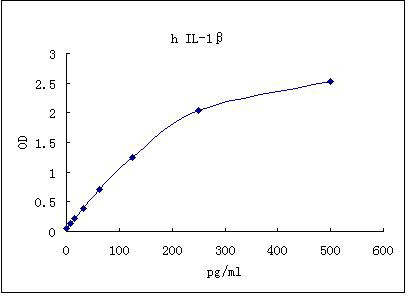Human IL-1 beta ELISA Kit (96-well)
CNY 3,940.00
Specifications
| Product Data | |
| Description | Human IL-1 beta ELISA Kit (96-well) |
| Size | 1 x 96 wells |
| Format | 96-well strip plate |
| Assay Type | Solid Phase Sandwich ELISA |
| Assay Length | 3 hours |
| Signal | Colorimetric |
| Curve Range | 7.8-500pg/ml |
| Sample Type | Cell culture supernatant, serum, plasma (EDTA, citrate, heparin) |
| Sample Volume | 20 uL |
| Specificity | Natural and recombinant Human IL-1β Ligand |
| Sensitivity | 2pg/mL |
| Reactivity | Human |
| Interference | No significant interference observed with available related molecules. |
| Components |
|
| Background | Interleukin-1 (IL-1), originally described as lymphocyte activating factor (LAF) for its effects on thymocytes, is a polypeptide cytokine with two molecular forms. The two distinct molecular forms of IL-1 are thought to be derived from two genes. After transcription, as 31kD precursor polypeptide is cleaved to give rise to mostly cell membrane associated IL-1. and secreted IL-1.. Both have the same molecular weight of 15kD but have different isoelectric points of 5 and 7, respectively. Despite sequence homology of only 20%, both forms are thought to bind to the same receptor. IL-1 inhibitors that vary only in their degree of glycosylation have been described to bind to the IL-1 receptor. These inhibitors are structurally related to IL-1. and may be important in regulation of IL-1. action. IL-1. is produced primarily by monocytes and macrophages but also by astrocytes, oligodendroglia, adrenal cortical cells, NK cells, endothelial cells, keratinocytes, megakaryocytes, platelets, neurons, neutrophils, osteoblasts, Schwann cells, trophoblasts, T cells, and fibroblasts. IL-1 has multiple immunological functions including enhancement of IL-2 production by T cells and activation of B-cells (BAF) and thymocytes. A true pleiotrope, IL-1 may have tumoricidal activity via its release of IL-2 and Interferon gamma and indirectly antiviral by stimulating to release interferon beta. Low levels of IL-1. have been reported in normal serum. It is thought that IL-1 genes are induced to respond to tissue damage or in infection. Elevated levels have been reported in a number of infectious disease conditions and in noninfectious inflammatory conditions such as CrohnÂ?s disease. In addition to elevated serum levels, IL-1 has been found in synovial fluids of patients with rheumatoid arthritis and in cerebrospinal fluid after neurological inflammation or insult. At the other end of the spectrum, low levels of IL-1 have been found in malnutrition and advanced neoplasia suggesting perhaps a complex immunological and physiological regulatory role for this cytokine. |
| Gene Symbol | IL1B |
| Standard Curve |

Representative standard curve for IL-1 ELISA. IL-1 was diluted in serial two-fold steps in Sample Diluent.
|
Documents
| Product Manuals |


 United States
United States
 Germany
Germany
 Japan
Japan
 United Kingdom
United Kingdom
 China
China

